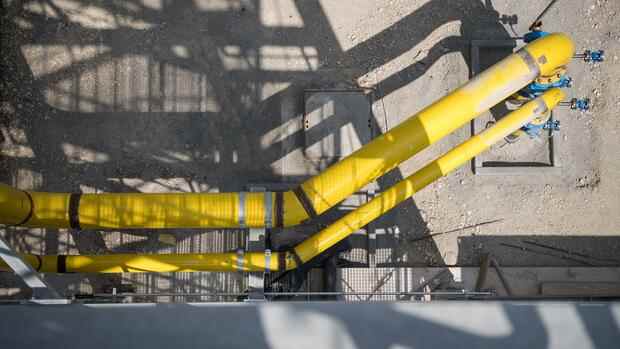Berlin According to the IW Institute, the Russian attack on Ukraine threatens to cause inflation in Germany to rise significantly again. The annual rate of inflation could climb up to 6.1 percent, said the German Economic Institute (IW) on Thursday.
The reason given was that Germany obtains more than half of the natural gas imports from Russia. Even if the Federal Republic could survive a short-term halt in gas supplies, gas prices would skyrocket. The IW has examined the effects of such a development on the German economy and consumers in a model simulation.
In January, inflation fell to 4.9 percent after hitting a nearly 30-year high of 5.3 percent in December.
In the first IW scenario the gas price in 2022 will remain at the level of the fourth quarter of 2021. The inflation rate would then rise to 4.3 percent in the current year (2021: 3.1 percent) and rise again to 4.5 percent in 2023.
Top jobs of the day
Find the best jobs now and
be notified by email.
“Consumers, but also companies, would have even less in their wallets than they already have,” the institute explained. Private consumption would fall as a result, which would also have an impact on gross domestic product (GDP): according to IW calculations, GDP would be 0.2 percent lower in 2022 and 0.7 percent lower in 2023.
The second scenario of the researchers expect even higher prices due to serious supply restrictions: gas prices are expected to rise by a further 50 percent. In this case, the inflation rate would climb to 6.1 percent this year and 5 percent in 2023. According to the IW, GDP would even be 1.4 percent lower next year.
Because of the corona pandemic and the already sluggish recovery, a further escalation in Ukraine would make the path to economic normality even more difficult. “The conflict entails dwindling investor confidence, possibly trade sanctions or lost production,” said IW study author Galina Kolev.
Co-author Thomas Obst added that the economic consequences of a military conflict can hardly be estimated. “The important role of energy security towards climate neutrality for the German economy is at a crossroads.”
“Risk of an energy crisis”
The Association of German Chambers of Industry and Commerce (DIHK) also fears serious economic consequences after the Russian invasion of Ukraine. DIHK President Peter Adrian said on Thursday: “The economic consequences of this invasion are not yet foreseeable, but they are certainly serious.”
Several economists also gave an assessment: “The Ukraine crisis is hanging over the German economy like the sword of Damocles,” said Commerzbank chief economist Jörg Krämer. “The problem is not German exports to Russia, which only account for two percent of all German exports. Instead, an escalation of the Ukraine crisis is causing great uncertainty, which is poison for the economy.”
Since Russia is a major gas supplier for Germany and Europe, Krämer sees “a certain risk of an energy crisis that would at least interrupt the upswing,” at least in the medium term.
ING Germany chief economist Carsten Brzeski also points to a “very high dependency” of the German economy on Russian gas and other raw materials: “The possible consequences of a further escalation can already be seen: an increase in gas prices, higher inflation and increasing uncertainty, the could in turn be reflected in less consumption and weaker investments in Germany.”
So far, economists have been assuming that the German economy will pick up again in the spring after a weak winter as a result of the Omicron wave. “The current tensions and a possible escalation may not be the big game changer, but they amplify the current risk factors for the German economy: inflation and uncertainty,” says Brzeski. “The expected spring upswing would get big dents.”
DIW still expects a “summer high”
The German Institute for Economic Research (DIW/Berlin) expects a “summer high” for the German economy despite the new burdens caused by the Russia-Ukraine conflict. The corona pandemic still has the German economy under control, but “the economic situation will probably improve significantly towards early summer,” predicted the DIW on Wednesday.
“In Central and Eastern Europe, the industry has well-filled order books. With the gradual resolution of the delivery problem, production should therefore pick up significantly from early summer,” says the DIW. For the full year 2022, the DIW predicts economic growth of 3.0 percent for Germany. That would be slightly more than last year, when GDP in Europe’s largest economy grew by 2.8 percent.
Dekabank chief economist Ulrich Kater considers a further increase in the price of energy commodities to be manageable from an economic point of view. “It could become more difficult if sanctions and counter-sanctions escalate,” says Kater. “Physical supply cuts can quickly halt production lines in Europe and elsewhere and are therefore more problematic for the economy than rising prices.”
More: Russian tanks invade Ukraine – Kiev calls the population to arms
